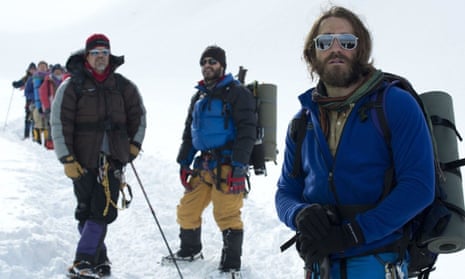Top of the world, ma? The Venice film festival has opened with the true story of an attempt on the summit of Mount Everest in 1996, directed by Baltasar Kormákur who made the action-thrillers Contraband and 2 Guns. It’s a disaster movie that isn’t a total success. Everest is an oddly subdued drama with plenty of ice, snow, beards, mountains, men shouting desperate instructions at each other through their snowy beards, above the deafening high winds. There’s a bit of don’t-look-down vertigo as our climbing heroes are expected to cross crevasses using ladders they appear to have bought from B&Q. And all the while the tremulous womenfolk are pining and whining on the end of a radio receiver or telephone while the heroic guys battle the elements.
In narrative terms it’s messy – as true stories tend to be. The dramatic focus is split between around half a dozen characters based on real people and it’s not clear who we should root for, or why, or why exactly this particular expedition went as wrong as it did compared to all the others. Weather considerations mean that each character tends to have a great big furry hood, reflecting sunglasses and beard, making it a bit difficult at times to know who’s shouting. And Jake Gyllenhaal has a role which is surprisingly peripheral and small. The poster appears to give him third-billing. It’s hardly that. His simple star power means that fans and non-fans alike will be waiting for Jake to save the day, or fail to save the day in some interesting way – or do something, anything at all. But no. Did Jake Gyllenhaal get lost in the edit?
Everest is set in a world (as they say in the trailers) where making attempts on the summit is a commercialised big business: no longer a matter of one or two climbers with their sherpas heroically alone in the majestic landscape. There is a virtual traffic jam of well-off middle-aged guys from all over the world being conducted up to the summit by professional guides: old enough to have amassed the money to pay the fee ($65,000 is the sum mentioned here), but also old enough to be, worryingly, not at the summit or peak of physical fitness.
One such guide is Rob Hall, played by Jason Clarke – an actor generally cast as the bad guy or hothead, but not here. Rob is the smart, capable, responsible professional. He has to enforce discipline and make his team of paying customers realise the dangers of doing something so unnatural as scaling Everest: “Human beings aren’t built to function at the cruising altitude of a 747.” His followers include Doug Hansen (John Hawkes) a part-time postman and Yasuko (Naoko Mori), an experienced and passionate climber. There is also the big-talking, big-headed Texan Beck Weathers (Josh Brolin). He also has an embedded journalist, Jon Krakauer (Michael Kelly), who went on to write one of the subsequent accounts of the ill-fated expedition.
Having Krakauer is a real coup for Rob, who expects his planned article to be good publicity for his business. In fact, Krakauer was originally supposed to be climbing with Rob’s rival team-leader, Scott Fischer, played by Jake Gyllenhaal, who seems like a bit of a boozer and slacker compared to the strictly disciplined Rob. They begin the film by having a tense conversation about poaching Krakauer – and another tense conversation about whether their rival teams should co-operate, in view of the chaos involved in having so many tour-groups jostling for space in narrow passes. You expect the movie to be centrally about Clarke and Gyllenhaal, and their friendship or enmity. But this idea disappears into the snowy ether.
Emily Watson plays Helen, the base camp manager and mum figure, whose job is to stay in radio contact with men for their Houston-we-have-a-problem crises and Keira Knightley and Robin Wright both have roles as the whingeingly tearful wives back home. It is disconcerting that these three very formidable stars are landed with such annoying and limp roles.
Finally, sentimental considerations of friendship appear to cause Rob and Doug to make a fatal mistake concerning the timing of their descent, but the nightmarish storm might have made things a calamity whatever they did and whenever they did it. It isn’t clear. But it also isn’t clear if their decisions are important or if it was just down to the implacable rage of the mountain gods. Josh Brolin’s swaggering Beck actually has one of the most extraordinary stories of all – perhaps the movie should have been just about him, like the story of Joe Simpson in the British documentary Touching the Void.
Everest is a frustrating movie in many ways – despite some lurches and shocks, it doesn’t quite deliver the edge-of-your-seat thrills that many were hoping for, and all those moderately engaging characters mean that there is no centrally powerful character: the women are drippy and the men not much less so. Krakauer’s question early on to the climbers about why they are doing it in the first place naturally elicits the hilarious group recitation of the age-old reply: “Because it is there!” Yet there is no other, more interesting answer. At the end of the film, audiences may feel they have laboriously made the summit, and come back – without getting much of a view.

Comments (…)
Sign in or create your Guardian account to join the discussion